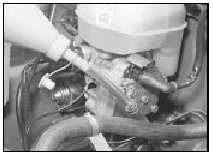Automatic transmission fluid level check (Every 12 000 miles (20 000 km) or 12 months)
1 Fluid level should be checked with the transmission at operating temperature (after a run) and with the vehicle parked on level ground.
2 Open and prop the bonnet. With the engine idling and the handbrake and footbrake applied, move the gear selector through all positions three times, finishing up in position “P”, 3 Wait one minute. With the engine still idling, withdraw the transmission dipstick (see illustration).

17.3 Automatic transmission dipstick location and markings
Wipe the dipstick with a clean lint-free rag, re-insert it fully and withdraw it again. Read the fluid level at the end of the dipstick: it should be between the two notches.
4 If topping-up is necessary, do so via the dipstick tube, using clean transmission fluid of the specified type (see illustration). Do not overfill.

17.4 Topping-up the transmission fluid
5 Stop the engine, refit the dipstick and close the bonnet.
6 Note that if the fluid level was below the minimum mark when checked or is in constant need of topping-up, check around the transmission for any signs of excessive fluid leaks.If present, leaks must be rectified without delay.
7 If the colour of the fluid is dark brown or black this denotes the sign of a worn brake band or transmission clutches, in which case have your Ford dealer check the transmission at the earliest opportunity.
See also:
Thermo-time switch - removal and refitting
Removal
1 Disconnect the battery negative lead.
2 Drain the cooling system as described in
Chapter 1.
3 Raise the front of the car and support it on
axle stands (see “Jacking and Vehicle
Support ...
Central (single-point) Fuel Injection (CFI) system
The system is best described by dividing it into four separate
sub-systems: air, fuel, engine management (EEC IV system), and ignition. ...
Headlamps and auxiliary lamps - beam alignment
The headlamps are adjustable individually
for both horizontal and vertical alignment from
within the engine compartment. The auxiliary
lamp adjustment is carried out by slackening
the lamp mountin ...
